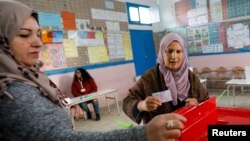Tunisia looked set for an ultra-low election turnout again Sunday as a parliamentary election ended with critics of President Kais Saied saying the near empty polling stations reflected public dismay at his seizure of broad powers.
The newly configured, and much less important, parliament is a central element of a political system Saied introduced last year after a July 2021 power grab that grants the presidency nearly untrammeled sway.
In the first round of voting for the parliament in December only 11% of the electorate took part, according to official data. Early turnout figures released by the electoral commission Sunday showed little improvement.
Polls closed at 6 p.m. (1700 GMT). Electoral commission figures had indicated 7.7% turnout by 3 p.m., only slightly higher than the 7.2% registered by the same time in December's vote.
A full-day turnout figure is due later Sunday, but final results may take longer to compile. With most parties boycotting the vote, most seats are expected to go to independents.
"I'm not interested in elections that do not concern me," said Nejib Sahli, 40, passing a polling station in the Hay Ettahrir district of Tunis early Sunday.
Independent electoral observers, including the local Mourakiboun group, have questioned official turnout figures, accusing authorities in many districts of withholding data they rely on to monitor the election's integrity.
The commission - over which Saied took ultimate authority last year - denied withholding numbers and said polling station officials had been too busy to cooperate with monitors.
Opposition groups have accused Saied of a coup for shutting down the previous parliament in 2021 and say he has trashed the democracy built after Tunisia's 2011 revolution that triggered the "Arab Spring."
Saied has said his actions were both legal and necessary to save Tunisia from years of corruption and economic decline at the hands of a self-interested political elite. Though his new constitution passed in a referendum last year, only 30% of voters took part.
Opposition activist Chaima Issa, who has led protests against Saied and faces a military court on charges of insulting the president, described the poll as a "ghost election."
Economic crisis
A Reuters journalist at one polling station in the Ettadamon district of Tunis said no voters attended during the 20 minutes he spent there.
At another Ettadamon polling station, one voter, who gave his name as Ridha, said he was supporting Saied. "He is a clean man fighting a corrupt system," he said.
At a cafe in Ettahrir, another Tunis district, only Mongi Layouni, one of seven men sitting drinking coffee, said he might vote.
"I don't know. Maybe I will go later," he said. Another man sitting in the cafe, who gave his name only as Imad, said he did not believe his vote mattered after Saied's political changes.
"The president alone is deciding everything," he said. "He does not care about anybody, and we do not care about him and his elections."
A deepening economic crisis, that has caused shortages of some foods and medicines and led the government to seek an international bailout, has added to widespread disillusionment with politics.
"We don't want elections. We want milk and sugar and cooking oil," said Hasna, a woman shopping in Ettadamon Sunday.
On Friday Moody's credit ratings agency downgraded Tunisian debt saying the country would likely default on sovereign loans.
Since December's vote, state television coverage has focused on the runoff. The opposition said this is part of an effort by the state to boost turnout.
"This is a fall from a great height. They are hiding their turnout rates," said Issam Chebbi, a political party leader.







